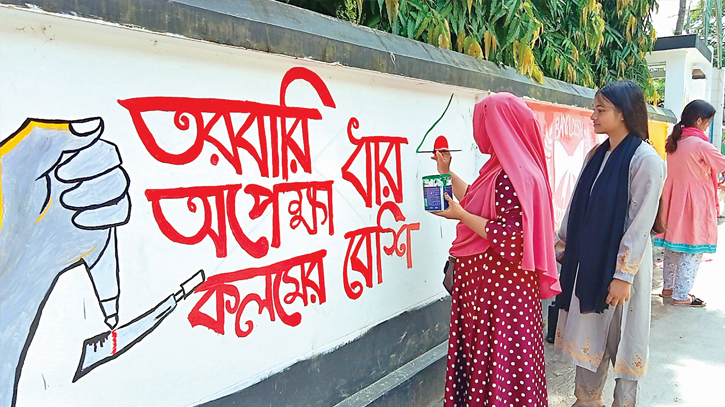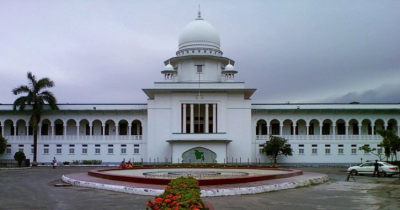
Female students from the anti-discrimination movement are seen drawing graffiti on a wall in Lalmonirhat city. Photo: Messenger
After Sheikh Hasina's resignation following the "Long March," widespread jubilation turned chaotic as miscreants caused vandalism, arson, and killings. With police stations burned and officers on strike, the country was left without governance. Students took charge, cleaning streets, and managing traffic to restore order.
These volunteer students took on the responsibility of cleaning up city and paint graffiti in the areas like cities like Barisal, Chattogram, Gaibandha, Mymensingh, Rangpur, and nearly 15 other districts.
Among them was Rashika Alam (17), who painted graffiti with the words "Gahi Samyer Gan" (We Sing the Song of Equality). She explained that this poem, written by Kazi Nazrul Islam, symbolizes gender equality. As civilization progresses, women have stood alongside men, reaching the pinnacle of success. In the future, everyone will work together to build a country free from discrimination, contributing to national development.
Azizun Toma (25), who was involved in cleaning the city and painting graffiti near the Parliament area in Dhaka, said that after joining the organization, her desire to work for the country and its people intensified. She had been working for underprivileged people who hadn’t benefited from development and had been striving to keep the environment clean and balanced.
“In the wake of recent movements, many faced challenges, and our environment's beauty was marred. At such a time, we took on tasks like graffiti, traffic management, and market monitoring to ensure the safety of people and to move our country forward in a new way.”
In the current situation of the country, not just the Red-Green Society, but hundreds of other organizations are painting the dream of a new Bangladesh in the hands of young men and women. At the end of this dream stand the students who led the movement, along with their guardians, workers, and the entire population of the country.
Earlier, in response to the demands of the protesting students, an interim government was formed. On August 8, Nobel Peace Prize laureate Professor Dr. Muhammad Yunus was formally sworn in as the Chief Adviser of this interim government. Sixteen advisors were appointed, including Nahid Islam and Asif Mahmud Sajib, who played key roles in the movement.
The impact of this youth-led movement is rippling across the nation, inspiring a new wave of activism and civic responsibility. Many students and young professionals, who once remained indifferent to politics, are now deeply engaged in the transformation of their communities. Workshops on social justice, environmental sustainability, and community organizing have sprung up in universities and local community centers, further fueling the desire for change.
The energy and optimism are palpable as the youth envision a future where their voices are heard and valued. The interim government, recognizing this momentum, has pledged to include youth representatives in decision-making processes, marking a significant shift towards inclusive governance.
Messenger/Fameema








